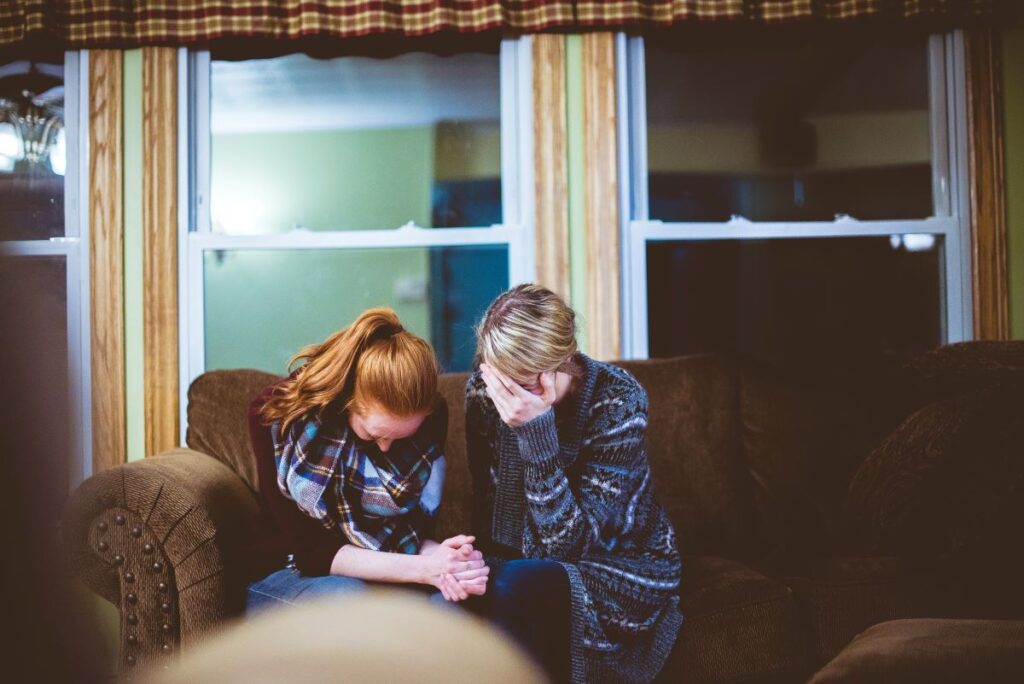
Grief is a normal response to loss. Grief affects and is affected by multiple areas of life: physical, emotional, cognitive, social, financial, spiritual, and behavioural. Grief in young people is more common than most people realise. For example, a longitudinal study of a representative sample in Scotland showed 62% of all children are bereaved of a close family member by age 10 (Paul & Vaswani, 2020).
Experiencing grief at a young age is a risk factor for later negative outcomes including suicide (National Confidential Inquiry into Suicide and Homicide by People with Mental Illness, 2017). However, research is mixed on the effect of early childhood loss and its impact on depression in later life.
Researchers in China have therefore published a systematic review and a meta-analysis of studies looking at parental loss in childhood and later depression in adulthood (Simbi et al 2020).

Nearly two-thirds of children are bereaved of a close family member by age 10.
Methods
The Simbi et al. (2020) meta-analysis included a systematic search of databases and found nine case-controlled studies from seven countries (USA, UK, Canada, Malaysia, Iran, Japan, and Sweden). To be included, studies had to be case-controlled studies of the association between parental loss in childhood and depression in adulthood and published in English. The authors didn’t exclude studies based on other factors such as date of publication or study location.
PRISMA guidelines were followed, and the authors also assessed the quality of each study using the Newcastle–Ottawa Scale from the Cochrane Collaboration (Wells et al., 2014).
Parental loss included the death of one or both parents, permanent separation from parents, and temporary separation from parents for at least 6 months or more.
Results
The nine included studies were of 716 young people who had experienced parental loss before the age of 18 and 2,068 individuals who did not experience such loss. The quality of the nine studies was deemed to be high.
- The results showed a link between any type of parental loss in childhood and an increased risk of depression in adulthood – by 2.16 times.
- Analysis of the four studies focused on parental death in childhood also showed an increased risk in adulthood. Specifically, adults who had one or both parents die in childhood were 1.76 times more likely to develop depression than adults who had not experienced such loss.

The death of a parent in childhood was associated with an increased risk of depression in adulthood by 1.76 times.
Conclusions
In summary, Simbi and colleagues’ (2020) study shows the loss of a parent from any cause before age 18 is a risk factor for depression in adulthood. Interestingly, the risk of depression seemed higher for adults who experienced separation from parents in children, than adults who experienced the death of a parent in childhood.

The loss of a parent from any cause before age 18 is a risk factor for depression in adulthood.
Strengths and limitations
The included studies were of high quality and there was no evidence of publication bias. However, there were only 9 studies in the meta-analysis, and only 4 were about the death of a parent in childhood. The authors focused on depression in adulthood, and it would be interesting to know the impact of parental loss on other symptoms as well as educational and occupational outcomes. This is all the more relevant because COVID-19 has led to more children experiencing the death of a parent (Hillis et al, 2021).

More research is needed on the long-term effects of the death of a parent in childhood.
Grief reduction in the treatment of anxiety and depression in young people: our Active Ingredients review
We wanted to understand the impact of grief reduction interventions on reducing anxiety and depression in young people aged 14-24 years. We worked with a Youth Advisory Committee to search the scientific literature and consulted with young people with lived experience of grief and anxiety and/or depression.
What did we find from the literature?
We conducted a systematic review and meta-analysis of grief reduction interventions for young people aged 14-24 years and found 27 studies from 9 countries. In summary:
- The most effective treatment was cognitive behavioural therapy (CBT) for grief, which had a large effect for anxiety and a medium effect for depression. Interventions with a higher degree of CBT strategies (more than 50% versus less than 50%) were more effective. Interventions of a medium/long duration (i.e., over 10 sessions) worked better than those with than a short duration. For anxiety, individual CBT for grief is more effective than when delivered in a group format.
- Supportive interventions had a moderate effect on anxiety and a small-moderate effect on depression, but CBT for grief was more effective than supportive therapy at follow-up of up to 12 months.
- Writing interventions had a small effect on grief symptoms, but not on anxiety or depression.
- No studies of CBT or supportive therapy examined mechanisms of action to determine the specific parts of the intervention that are effective.
What did young people aged 14-24 say?
The young people we consulted in workshops:
- Described experiencing barriers to recognising the need for support and in accessing support from systems that are under-resourced.
- Wanted to have their thoughts and feelings validated, to be listened to, and for interventions to be tailored to their needs.
- Considered suggestions about seeking social support to be unhelpful because peers may be unable or unwilling to support them in their grief.
- Emphasised the importance of psychoeducation about emotional states – but not stages of grief – and specific and practical strategies relevant to their experiences and symptoms.
What can we conclude?
CBT for grief (e.g., Boelen et al, 2021), of 10 sessions or more, in an individual format, with more than 50% of the intervention including specific CBT strategies, should be offered to grieving young people with symptoms of anxiety and depression.

CBT for grief demonstrates efficacy in reducing anxiety and depression in grieving young people.
Implications for practice
Simbi and colleagues’ (2020) study showed the long-term impacts of parental loss in childhood, but did not articulate any implications for practice.
Our analysis of the literature and consultation with young people provides several implications for practice:
- We found that grief reduction interventions appear safe and acceptable to young people, but are difficult to access.
- Evidence for the efficacy of grief interventions for young people delivered via the internet would inform accessibility and scalability in preventing and treating anxiety and depression in young people.
- CBT for grief is the most effective intervention for reducing symptoms of anxiety and depression in young people and should be the first line treatment and more readily available.
- Stages of grief and recommendations to seek support from untrained peers should not inform intervention.
- Grief should be considered in the assessment of young people experiencing anxiety and depression.
- CBT for grief should be offered to young people who find grief problematic for them.

CBT for grief should be the first line treatment for reducing symptoms of anxiety and depression in young people finding grief problematic.
Statement of interests
This work was funded by a Wellcome Trust ‘Active Ingredients’ commission awarded to Lauren Breen at Curtin University. The funder of the study had no role in study design, data collection, data analysis, data interpretation, or writing of the report.
We declare no competing interests.
Links
Primary paper
Simbi CMC, Zhang Y, Wang Z. (2020) Early parental loss in childhood and depression in adults: A systematic review and meta-analysis of case-controlled studies. Journal of Affective Disorders, 260, 272-280.
Other references
Boelen PA, Lenferink LIM, Spuij M (2021) CBT for prolonged grief in children and adolescents: A randomized clinical trial. American Journal of Psychiatry, 178(4), 294-304.
Hillis SD, Unwin HJ, Chen Y et al. (2021) Global minimum estimates of children affected by COVID-19-associated orphanhood and deaths of caregivers: A modelling study. The Lancet, 398, 391-402.
National Confidential Inquiry into Suicide and Homicide by People with Mental Illness. (2017). Suicide by children and young people. Manchester: University of Manchester.
Paul S, Vaswani N. (2020) The prevalence of childhood bereavement in Scotland and its relationship with disadvantage: The significance of a public health approach to death, dying and bereavement. Palliative Care and Social Practice, 14.
Wells GA, Shea B, O’Connell D et al. (2014) The Newcastle–Ottawa Scale (NOS) for assessing the quality of nonrandomised studies in meta-analysis. Ottawa Hospital Research Institute, Ottawa. Retrieved from
Photo credits
- Photo by Sandy Millar on Unsplash
- Photo by Yousef Espanioly on Unsplash
- Photo by Eric Ward on Unsplash
- Photo by Bekky Bekks on Unsplash
- Photo by Ana Municio on Unsplash
- Photo by Ben White on Unsplash
- Photo by Priscilla Du Preez on Unsplash
